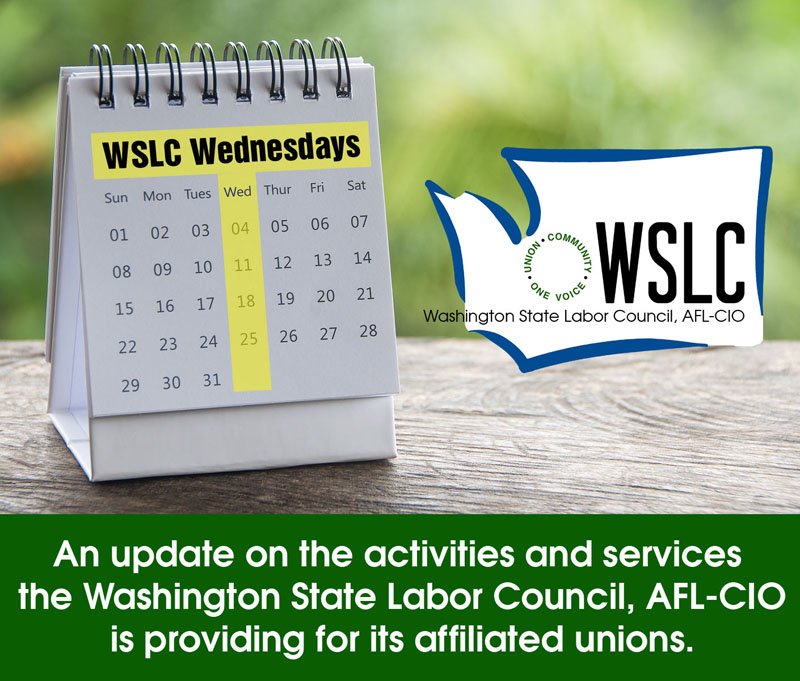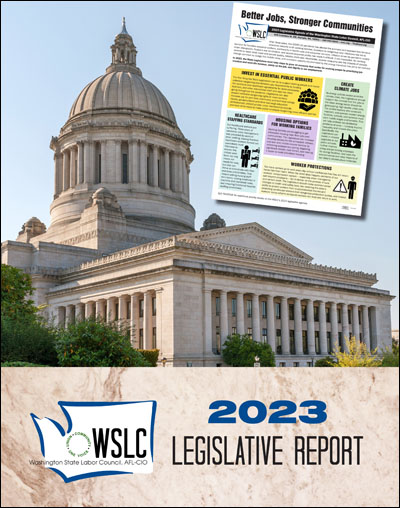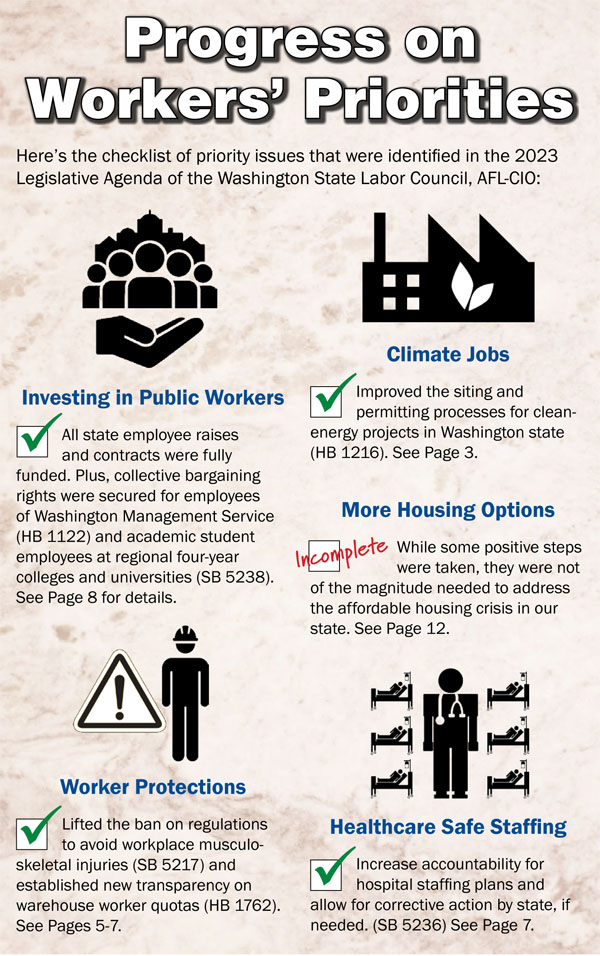STATE GOVERNMENT
WSLC Legislative Report: Progress on workers’ priorities
Washington State Labor Council, AFL-CIO publishes its session summary, voting record
 OLYMPIA (July 12, 2023) –The Washington State Labor Council, AFL-CIO has published its 2023 Legislative Report, which summarizes this year’s legislative session and shows how state legislators voted on bills of importance to Washington’s working families. (Download the full 18-page 2023 Legislative Report or just the 4-page 2023 Voting Record.)
OLYMPIA (July 12, 2023) –The Washington State Labor Council, AFL-CIO has published its 2023 Legislative Report, which summarizes this year’s legislative session and shows how state legislators voted on bills of importance to Washington’s working families. (Download the full 18-page 2023 Legislative Report or just the 4-page 2023 Voting Record.)
This year’s edition of the publication, which the WSLC has produced for many decades, has been redesigned to try to make it both more comprehensive and easier to navigate and read. It also should be easier to file and use as a reference than the WSLC’s previous tabloid newspaper-style report.
 “We thank our exceptional Legislative team of Sybill Hyppolite, John Traynor, Joe Kendo and intern Sierra Turner, plus Communications staffers David Groves and Sarah Tucker, for writing and compiling this report,” wrote WSLC President April Sims and Secretary Treasurer Cherika Carter in the report’s introduction. “We are always interested in your feedback about the services the WSLC provides, including this Legislative Report. So contact us at wslc@wslc.org and let us know what you like and what you’d like to see improved in this report.”
“We thank our exceptional Legislative team of Sybill Hyppolite, John Traynor, Joe Kendo and intern Sierra Turner, plus Communications staffers David Groves and Sarah Tucker, for writing and compiling this report,” wrote WSLC President April Sims and Secretary Treasurer Cherika Carter in the report’s introduction. “We are always interested in your feedback about the services the WSLC provides, including this Legislative Report. So contact us at wslc@wslc.org and let us know what you like and what you’d like to see improved in this report.”
Here is a summary excerpted from the report:
No matter what we look like or where we live in Washington state, most of us want similar things. We want good-paying jobs, an affordable place to live, health care for our families, a quality education system—all things that should be universal for working families, but are not.
Recognizing that too many families are struggling to attain these fundamental necessities, the “Better Jobs, Stronger Communities” 2023 legislative agenda of the Washington State Labor Council, AFL-CIO centered these priorities. And as we seek policies to improve people’s lives, the WSLC examines all of its legislative advocacy through a racial equity lens to ensure no communities are left behind.
 In large measure, the expanded pro-worker majorities in the Washington State Legislature responded to the labor movement’s calls to action. As you will read throughout this 2023 Legislative Report, important progress was made on creating clean-energy jobs, improving workplace safety, funding public education, raising staffing standards at hospitals, increasing housing options, promoting apprenticeship, and importantly, keeping Washington’s public employees from falling further behind the rising cost of living.
In large measure, the expanded pro-worker majorities in the Washington State Legislature responded to the labor movement’s calls to action. As you will read throughout this 2023 Legislative Report, important progress was made on creating clean-energy jobs, improving workplace safety, funding public education, raising staffing standards at hospitals, increasing housing options, promoting apprenticeship, and importantly, keeping Washington’s public employees from falling further behind the rising cost of living.
However, some critical pro-worker bills languished and failed to pass. They include legislation protecting rail workers’ jobs when they get sick, creating supply chain transparency for major public works projects, allowing workers to decline attending anti-union “captive audience” meetings, and more. Plus, our state needs to continue efforts to rebalance our upside-down tax code by having the wealthiest pay their fair share to fund our state’s critical needs.
The United Labor Lobby is a team of union lobbyists and advocates who meet throughout the session at the WSLC’s Olympia office. Together, we share which bills and issues are in play, and how we can support one other. It’s truly inspiring to work alongside these dedicated professionals.
But even more important are the many union members who come to Olympia during the legislative session to share their personal stories at hearings, or meet with their legislators, or demonstrate outside the State Capitol. Your voices are heard and are a key part of our success in advancing pro-worker policies.
Together, we are building a more just, equitable, and prosperous future for everyone in Washington. So let’s celebrate our achievements in 2023 and rededicate ourselves to pushing even harder in 2024 for the pro-worker legislation that didn’t pass… yet.
WSLC Wednesdays is a feature of The Stand where different departments of the Washington State Labor Council, AFL-CIO describe their recent activities and the services they are providing to WSLC-affiliated unions.


